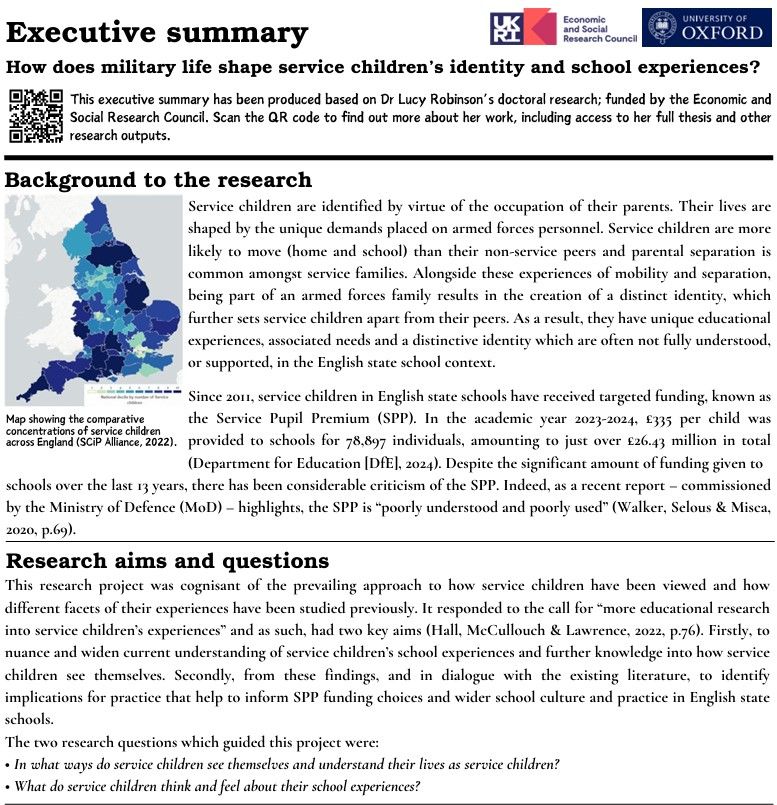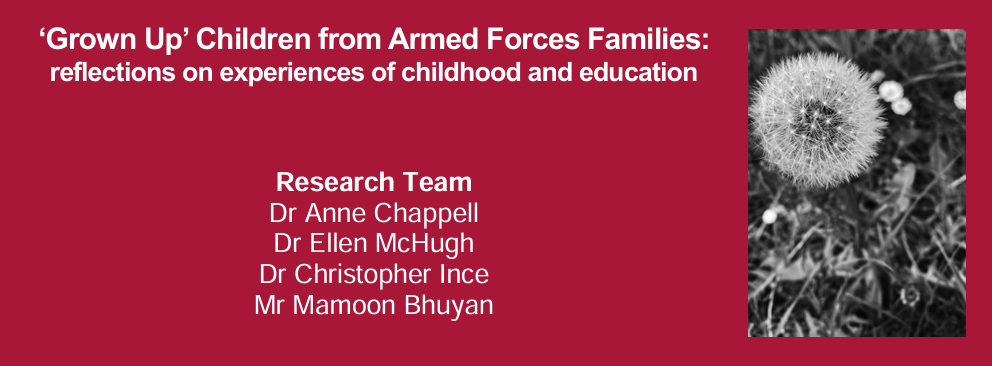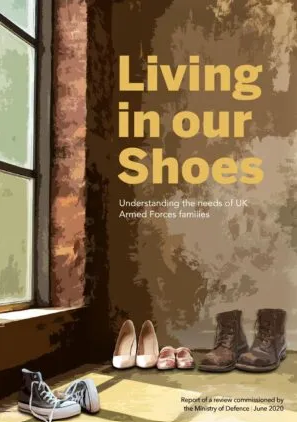Research spotlights: April 2025

Doctoral research: How does military life shape service children's identity and school experiences?
Dr Lucy Robinson has recently completed her ESRC-funded PhD at the Department of Education, University of Oxford. Her doctoral research involved working creatively with groups of service children to explore how military life shapes their identity and school experiences. You can read her full thesis or a 3-page executive summary.
Lucy has recently won the The FiMT Research Centre's 2025 Early Career Researcher Award and will be speaking at theirupcoming conference happening on 20th May.

‘Grown up’ children from armed forces families
Research Team: Dr Anne Chappell, Dr Ellen McHugh, Dr Christopher Ince & Mr Mamoon Bhuyan
This project explored the reflections of ‘grown up’ children from Armed Forces families on their childhood and educational experiences.

These ‘grown up’ children have been overlooked in research, policy and practice, as the main focus has historically been on serving members of the military and veterans, with some exploration of the families, including school-aged children.
The Office for Students note that children from Armed Forces families face ‘very specific and complex barriers’ (OfS, 2020: para 9) and this has been recognised in the English government’s Service Pupil Premium funding, provided to schools since 2011 (MoD, 2023). Although research has been undertaken with school-aged children, we know very little about the childhood and educational experiences from those now grown up.
The reflections from this unique group of adults that cannot be elicited from anywhere else, provide knowledge about how childhood and education as part of an Armed Forces family have been experienced, and the implications of this. The outcomes of this project provide recommendations for policy, practice and research for current children who are in this context, their families, and those that work with and for them. This provides an evidence-based foundation for support for the children, as they move through childhood, schooling, further study and work, and make their transitions into adulthood.
Living in Our Shoes Revisited: Project reviewing the support for Armed Forces families
The publication of the ‘Living in Our Shoes’ report five years ago highlighted the unique challenges faced by UK Armed Forces families and made over 100 recommendations for change. Forces in Mind Trust has now awarded £329,366 for research to evaluate the progress in meeting these challenges, determine the future priorities for families, and recommend the actions required by government and the third sector.
During the 30-month project, the research team will analyse recent changes in the strategic context, conduct a high level policy review, and undertake an in-depth evaluation of each of the identified priority areas of need, highlighting examples of best practice in support of Armed Forces families.

The research will be carried out by two co-authors of the Living in Our Shoes report, Professor Janet Walker OBE and Dr Gabriela Misca, together with Mr Peter Davis OBE, who previously led on Armed Forces Families policy in the Ministry of Defence. The research project is hosted by the University of Birmingham under the leadership of Dr Misca as Principal Investigator.
Research on the Impact of Bereavement Support for Military Children
Anglia Ruskin University’s Veterans and Families Institute for Military Social Research (VFI) is launching a new research project in partnership with Scotty’s Little Soldiers to examine how being part of a military-specific charity shapes a bereaved child or young person’s sense of identity.

Funded by the Centre of Excellence for Equity in Uniformed Public Services (CEEUPS) at Anglia Ruskin University, the £25,000 study will be conducted using a co-created qualitative descriptive approach. Researchers will work closely with members of Scotty’s Council, a group of Scotty’s beneficiaries aged 12-25 with lived experience of military bereavement. Scotty’s Council provides a voice for bereaved military children and young adults, offering insights that help shape the charity’s support services and future direction.
The study is due to be completed by late summer, with expected outputs including a detailed research report, academic journal articles, and recommendations to inform future support strategies for bereaved military children. The findings will contribute to a growing body of research on the impact of childhood bereavement in military families and inform further exploratory work regarding the support needed for bereaved children and young people across the wider uniformed public services sector.
Dr. Faye Acton is the lead researcher on the project.
Dr Faye Acton is Research Fellow and the lead for military connected children and young people in the Veterans and Families Institute for Military and Social Research (VFI) at Anglia Ruskin University. As a qualitative researcher her work is focused on developing practice-based evidence with the voices and lived experiences of children and young people at the core of her work. She is particularly interested in developing the concept of identity and understanding military connected children and young people’s lives more comprehensively, including school and educational experiences. Faye has both academic and professional experience of working with both children and young people and professionals to inform and enhance policy and practice.
Research on how moral injury affects the broader family system
Kathryn Reeves is completing her Master of Arts in Family Studies at Mount Saint Vincent University in Halifax, Nova Scotia. Her research focuses on the intergenerational impacts of military service-related moral injuries, emphasizing the experiences of children of military Veterans. In this section, Kathryn tells us a bit about her work.
Moral injury, or the profound psychological and social impacts of witnessing, perpetrating, or failing to prevent an act that goes against personally held moral beliefs, has often been looked at through a medicalized model that emphasizes individual experiences. However, my previous research demonstrates that children in military families are profoundly aware of and impacted by parental moral injury. Through qualitative interviews, I give voice to these often-overlooked individuals, capturing their insights, stories, and recommendations as they relate to parental moral injury and policies impacting military families. My work is generously supported by Research Nova Scotia, the Royal Canadian Legion, and Mount Saint Vincent University.
Drawing on my own upbringing in a military family, I understand the unique challenges faced by military children. Military children navigate not only the challenges common to all young people but also frequent relocations, long separations from parents, and the invisible emotional weight that service life can bring into a home. Yet despite these added stressors, their direct experiences are rarely acknowledged in civilian society, or even within military systems themselves. I am committed to making the unseen impacts of military family life visible through research.
My current project explores how a parent's service-related moral injury affects the broader family system, offering a critical ecological perspective on the ripple effects of moral injury. In the broader landscape of military family research, this work fills a crucial gap. While much research has focused on the psychological impacts on Veterans themselves, far less attention has been paid to the "secondary" or ripple effects on their families, particularly on children. This ecological approach challenges the idea that moral injury is an isolated event, instead framing it as a dynamic experience that unfolds across relationships and generations. By amplifying the voices of adult children of Veterans, my work highlights the need for greater awareness and support for military families across Canada.
Following the completion of this degree, I will be heading to the University of Windsor to pursue her PhD in clinical psychology.
Supporting All to Thrive (SATT) Project
The Supporting All to Thrive study will provide a clear picture of the educational outcomes of children from Armed Forces backgrounds who have additional needs and/or disability, linked to a nuanced understanding of the dynamics and complexities characterising their educational trajectories and experiences.

The study is led by a team of researchers from Oxford Brookes University, and is guided by a Steering Group of expert stakeholders. It is funded by the Armed Forces Covenant Fund Trust, under the MOD Armed Forces Family Fund Research Grant programme.
The project runs from March 2024 to August 2025, and has MOD Research Ethics Committee approval (ref: 2316/MODREC/24).




